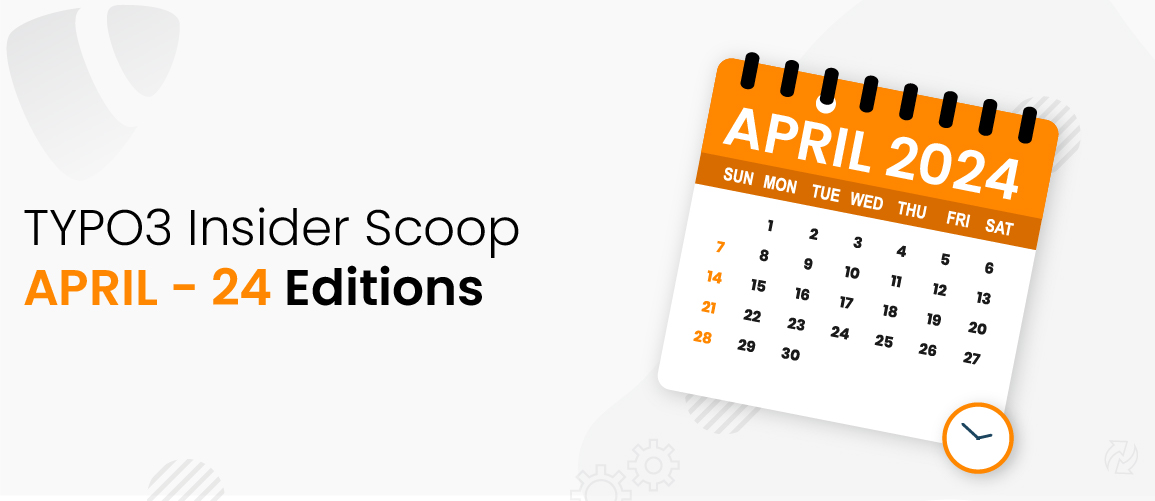Introduction
In the upcoming years, the role of AI technology in content management cannot be overstated. As we move forward into 2024, the trajectory of AI in the content marketing industry is clear—it's on the rise, and it's changing the game. At the forefront of this AI revolution stands ChatGPT, a smart AI-driven chatbot that has gained attention and acclaim.
Now, more than ever, it's crucial for content marketers and CMS professionals to have the potential of ChatGPT. This sophisticated AI tool isn't just making waves; it's reshaping the very foundations of content management. Whether you're at the beginning of a content-driven website or deeply involved with Content Management Systems, you simply cannot afford to ignore the myriad possibilities that ChatGPT offers.
Our journey through this transformative blog will explore the intersection of ChatGPT and TYPO3, a CMS renowned for its adaptability and versatility. By the end of this blog, you'll understand how ChatGPT can be the catalyst for a CMS renaissance, propelling your TYPO3-powered digital presence to new heights.
So, let's go on this exciting exploration into the future of content management, guided by the capabilities of ChatGPT. This blog is all about TYPO3 and OpenAI’s ChatGPT, how they together or when combined can shape your experience, how it will help you modify things and help you increase your productivity. So, Let’s roll!
Understanding TYPO3 Websites
To fully appreciate the integration of ChatGPT within the TYPO3 ecosystem, it's crucial to grasp the essential concepts behind TYPO3 websites. TYPO3, an open-source content management system (CMS), stands as a stalwart, boasting a rich history and wonderful feature set that makes it a preferred choice for individuals and organizations alike.
At its core, TYPO3 serves as a versatile and adaptable platform for building and managing websites. It provides users with the tools and resources necessary to create web experiences that align precisely with their unique goals and requirements. Whether you're developing a simple blog, a complex e-commerce platform, or a multimedia-rich corporate portal, TYPO3 offers the flexibility to accommodate your vision.
One of TYPO3's defining strengths lies in its content management capabilities. The platform simplifies content creation and organization, allowing users to generate a wide range of digital assets, including articles, images, videos, and more. These assets can be structured hierarchically and effortlessly deployed throughout a website, and the content management process.
However, TYPO3's scope extends beyond content management. It boasts user management features that facilitate seamless collaboration among team members. This includes fine-grained user access control, various permission levels, and the ability to define specific user roles, ensuring a secure and collaborative working environment, and more.
TYPO3 places a strong emphasis on search engine optimization (SEO), enabling users to optimize their websites for improved discoverability on search engines like Google. Its comprehensive SEO tools helps users to fine-tune content, meta tags, and URLs, enhancing their website's visibility to target audiences.
Role of ChatGPT in Content Management
Organizations and individuals alike grapple with the tedious tasks of not only creating but also effectively curating, optimizing, and delivering content to their audiences. Artificial Intelligence (AI) comes as a powerful ally, fundamentally transforming the way we manage content.
ChatGPT in Content Creation
One of the most significant contributions of ChatGPT to content management lies in content creation itself. AI-driven tools and algorithms have evolved to a point where they can autonomously generate text, images, videos, and more. These tools are not mere gimmicks but sophisticated systems that can craft content that is coherent, contextually relevant, and even emotionally resonant.
Imagine a world where AI can draft compelling articles, design visually stunning graphics, or even compose music dedicated to specific moods or themes. These capabilities have far-reaching implications for content creators, as they allow for the automation of routine content generation tasks, freeing up creative minds to focus on more strategic and inventive aspects of their work.
Content Optimization with ChatGPT
ChatGPT also plays a pivotal role in optimizing content for maximum impact. Content performance analytics, powered by AI, provide valuable insights into audience behavior, helping creators refine their strategies. AI-driven personalization engines study user preferences and behavior patterns, enabling content platforms to deliver custom-made experiences to each visitor. This not only enhances user engagement but also contributes to higher conversion rates.
Content Organization and Tagging
ChatGPT’s capabilities extend to the meticulous organization and tagging of content. Through Natural Language Processing (NLP) and computer vision, AI systems can categorize and tag content items with remarkable accuracy. This helps organizations not only simplify content management but also have search functionality for users, making it easier for them to find what they need.
Future of AI in Content Management
The future holds exciting possibilities for AI in content management. Real-time SEO suggestions, content gap identification, advanced analytics, and custom AI solutions all to specific business needs are on the horizon.
AI isn't replacing humans but augmenting their capabilities. It automates routine tasks, freeing up time for creative and strategic endeavors. As we have AI in content management, businesses can focus on enhancing customer experiences, driving efficiency, and staying ahead in the digital transformation journey.
In a world where data continues to grow, AI in content management is not just an investment but a necessity. Those who adapt AI will lead the way and secure their future success in the evolving digital world.
On this Note we have come up with exciting news!
We have Integrated OpenAI's ChatGPT to TYPO3 Websites!
Key Statistics

- Chat GPT reached 100 million users faster than any other app. By February 2023, the chat.openai.com website saw an average of 25 million daily visitors. eMarketer predicts that more than 20% of all Americans will use ChatGPT at least once per month in 2024.
- The global AI market size is expected to be worth $407 billion by 2027. That’s a compound annual growth rate of 36.2% from 2022.
- More than 100 million people in the U.S. will use generative AI by 2024. By 2025, that number is expected to reach 116.9 million. eMarketer predicts that more than half of all Americans aged 12 to 44 will use generative AI by 2025.
How Can OpenAI's ChatGPT be Helpful for the TYPO3 Website?
Integration of OpenAI's ChatGPT into TYPO3 introduces a new dimension to content management, enhancing user experiences and streamlining various aspects of website operations.
1. Content Generation and Assistance
ChatGPT is a powerhouse when it comes to content generation. Whether you need to draft engaging blog posts, create product descriptions, or generate Meta Tags. ChatGPT can assist by providing well-structured, contextually relevant content. TYPO3 users can use ChatGPT to automate content creation, reducing the time and effort required for routine writing tasks.
For our TYPO3 ChatGPT Extension, we have included the ChatGPT Toolbar right in the Rich Text Editor (RTE). This makes things super handy for TYPO3 editors.
2. Content Optimization
AI-driven content optimization is a game-changer for SEO. ChatGPT can analyze content and provide real-time suggestions for improving search engine rankings. TYPO3 users can benefit from ChatGPT's insights on keyword optimization, readability, and content structure, ensuring that their content is not only informative but also highly discoverable.
With this note we have integrated ChatGPT right into your page "SEO" tab. This feature will help you generate various Meta Tags like Meta Title, Meta Description, Meta Keywords, Open Graph Tags and much more. Making your task easy-peasy!
3. Multilingual Support
For TYPO3 websites with a global audience, ChatGPT offers multilingual capabilities. It can assist in translating content, making it accessible to a broader range of users. Whether you need to translate articles, product descriptions, or user-generated content, ChatGPT can provide accurate and contextually relevant translations.
4. Customer Support and Engagement
ChatGPT can enhance customer support by providing instant responses to user queries. TYPO3 websites can integrate ChatGPT as a virtual assistant, offering 24/7 support for common questions and issues. This not only improves user satisfaction but also reduces the workload on customer support teams.
5. Automated Content Curation
Efficiently curating and categorizing content is crucial for user navigation and search functionality. ChatGPT can assist in automatically tagging and categorizing content items in TYPO3. This feature streamlines content organization, making it easier for users to find the information they need.
To have this promptly we have added a Product/Blog Outline feature which will help you create an outline about any blog posts or product landing pages right with a single click, that too from TYPO3 Backend dashboard itself.
6. Personalization and Recommendations
ChatGPT's ability to analyze user behavior and preferences enables personalized content recommendations. TYPO3 websites can use ChatGPT to deliver specific content, product recommendations, and offers to individual users, enhancing user engagement and conversion rates.
7. Better Workflow
Typing out repetitive responses and performing routine content-related tasks can be time-consuming. ChatGPT automates these processes, allowing TYPO3 users to structure their workflow. Whether it's handling user inquiries or managing content tags, ChatGPT accelerates operations and reduces manual effort.
8. Improved Accessibility
ChatGPT can assist in making content more accessible by generating alternative text for images and providing audio descriptions. This accessibility enhancement makes sure that TYPO3 websites are inclusive and comply with web accessibility standards.
9. Content Planning and Strategy
Planning an effective content strategy is crucial for website success. ChatGPT can assist in brainstorming content ideas, suggesting topics, and even helping with content calendars. TYPO3 users can rely on ChatGPT to generate ideas that resonate with their target audience.
Integrating TYPO3 with ChatGPT
Integrating the TYPO3 and ChatGPT would be super easy when it comes to using T3Planet's TYPO3 ChatGPT Extension. TYPO3 ChatGPT Extension is a straightforward process, much like incorporating any other TYPO3 extension from T3Planet.
How To integrate ChatGPT into your TYPO3 website?
Begin by visiting the T3Planet website or the link mentioned below, Select a pricing Free or Premium as per your requirements, Make the payment and you will get a Product key on the registered Email Id. Now download and Install the same to your TYPO3 Instance, mention the “ns_license” key in the license manager and you are good to go! It’s that easy!
For the detailed procedure please follow our documentation for Extension Integration as mentioned below
That’s all, Happy TYPO3 + ChatGPT Duo!
Conclusion
In conclusion, the integration of OpenAI's ChatGPT into TYPO3 websites offers a multitude of benefits, ranging from content creation and optimization to customer support and automated curation. This AI-powered tool not only enhances efficiency but also elevates user experiences, making TYPO3 websites more engaging, accessible, and user-friendly. Plus it’s a boon for productivity!















Comments and Responses